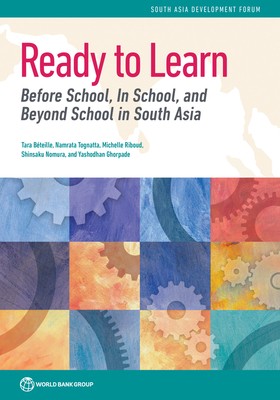
- We will send in 10–14 business days.
- Author: Tara Béteille
- Publisher: World Bank Publications
- Year: 2019
- Pages: 220
- ISBN-10: 1464813272
- ISBN-13: 9781464813276
- Format: 17.5 x 25.2 x 2.3 cm, minkšti viršeliai
- Language: English
- SAVE -10% with code: EXTRA
Reviews
Description
Countries that have sustained rapid growth over decades have typically had a strong public commitment to expanding education as well as to improving learning outcomes. South Asian countries have made considerable progress in expanding access to primary and secondary schooling, with countries having achieved near-universal enrollment of the primary-school-age cohort (ages 6+"11), except for Afghanistan and Pakistan. Secondary enrollment shows an upward trend as well. Beyond school, many more people have access to skilling opportunities and higher education today. Although governments have consistently pursued policies to expand access, a prominent feature of the region has been the role played by nonstate actors--private nonprofit and forprofit entities--in expanding access at every level of education.
Though learning levels remain low, countries in the region have shown a strong commitment to improving learning. All countries in South Asia have taken the first step, which is to assess learning outcomes regularly. Since 2010, there has been a rapid increase in the number of large-scale student learning assessments conducted in the region. But to use the findings of these assessments to improve schooling, countries must build their capacity to design assessments and analyze and use findings to inform policy.
EXTRA 10 % discount with code: EXTRA
The promotion ends in 21d.07:24:46
The discount code is valid when purchasing from 10 €. Discounts do not stack.
- Author: Tara Béteille
- Publisher: World Bank Publications
- Year: 2019
- Pages: 220
- ISBN-10: 1464813272
- ISBN-13: 9781464813276
- Format: 17.5 x 25.2 x 2.3 cm, minkšti viršeliai
- Language: English English
Countries that have sustained rapid growth over decades have typically had a strong public commitment to expanding education as well as to improving learning outcomes. South Asian countries have made considerable progress in expanding access to primary and secondary schooling, with countries having achieved near-universal enrollment of the primary-school-age cohort (ages 6+"11), except for Afghanistan and Pakistan. Secondary enrollment shows an upward trend as well. Beyond school, many more people have access to skilling opportunities and higher education today. Although governments have consistently pursued policies to expand access, a prominent feature of the region has been the role played by nonstate actors--private nonprofit and forprofit entities--in expanding access at every level of education.
Though learning levels remain low, countries in the region have shown a strong commitment to improving learning. All countries in South Asia have taken the first step, which is to assess learning outcomes regularly. Since 2010, there has been a rapid increase in the number of large-scale student learning assessments conducted in the region. But to use the findings of these assessments to improve schooling, countries must build their capacity to design assessments and analyze and use findings to inform policy.


Reviews